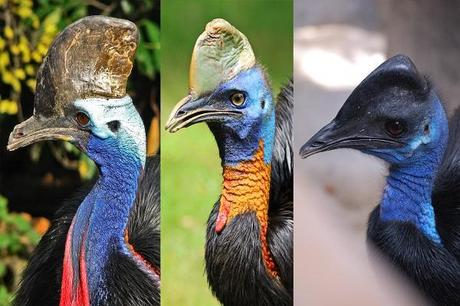
The ostrich and the emu take the top spots when it comes to the discussion over the largest birds in the world. However, none of them are as interesting to look at as the cassowary which despite being named the most dangerous bird in the world, also happen to be very beautiful and mysterious. There is so much about this amazing flightless bird that biologists haven’t put together yet. From their tough crests to clawed feet and strange genitalia, the Cassowary look like aliens on our planet but they have proved themselves to be survivors against the tough odds the species face. Here are 10 amazing facts about this bird believed to be the last Dinosaurs on Earth.
They Have Really Strange Genitalia
Penises aren’t limited to the males in cassowaries as it is in other birds and animals. Both the males and the females have pseudo-penises that aren’t connected to their internal reproductive organs and therefore useless in reproduction. The males use their cloaca to deliver sperm to the females which is one of the greatest mysteries in the bird world. The male’s penis is usually retracted most of the time although it becomes active when mating.
Yes! They Can Kill You
In 2019, sad news came from Florida when a cassowary killed Marvin Hajos, the owner of the exotic bird sanctuary where the bird was housed. There is also documented evidence of a cassowary having killed someone in Australia in 1926. The capability of a cassowary to kill a human being lies in their aggressiveness, especially when protecting their nests and chicks or their food sources.
The bird’s toes have claws meant for foraging in the ground but which can scratch and cause deep gushes in a human being. Cassowary beaks use to pluck fruits can also be used as a weapon that will strike you repeatedly. The cassowary’s greatest weapon against a human being is its weight which it can use to cause you to fall down with just a single leap.
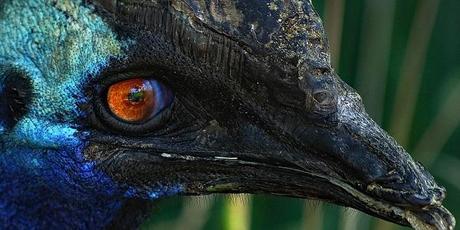
The Females Are Fiercely Territorial
Cassowary are territorial solitary birds and the females determine how large and fertile their territories are and which males are allowed to live and forage in it. Once a female marks out a territory and selects the males she is willing to mate with, she becomes territorial and will fight off other females viciously if they come too close. Females also venture into other females’ territories and destroy eggs belonging to their rivals in a bid to attract males to themselves and further their own lineage. A female cassowary’s greatest enemy is her fellow females since the males are the scarce resource to these birds.
Their Crests Are Shrouded In Mystery
Cassowary start growing the tough horn-like structures above their heads at the age of two, and it keeps growing as long as they live, so the older the bird, the longer its crest will be. The crests are made of keratin, the same protein found in human nails, so you can look at it as a large nail on top of the head. Biologists haven’t figured out what these crests serve though. Some claim that they are for protecting the bird as it cuts through the forest undergrowth. Others claim that it affects the sound each bird emits, therefore affecting communication. The most convincing theory is that the crests are just for beauty and used to assert dominance.
The Males Do The Babysitting
In other bird species, females lay eggs and incubate them until they hatch which is the toughest job in reproduction. However, with cassowaries, females only mate with the male and then lay the eggs, leaving the males to incubate them. The males then have to take care of the chicks for up to nine months teaching them to forage and locate the best food until they are old enough to fend for themselves. Females can actually relieve the male of their duties when they want to mate therefore chasing away the chicks to allow them have their time with the males.
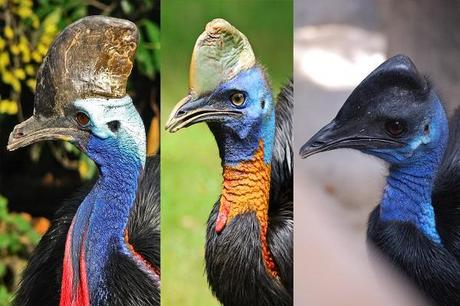
They Are Frugivores But Don’t Shy Away From Other Foods
The cassowary’s digestive system is soft on fruit as it only takes the fruits section leaving the seeds. Cassowary, therefore, has to consume lots of fruits, up to 11 pounds in a day to get their fill. Fruits are the basic source of food for these birds but they are seasonal and sometimes don’t offer sufficient nutrition so a cassowary won’t spare insects, small reptiles and even mammals. Cassowary sometimes eats the partially digested fruit pooped by other cassowaries because plucking fruits isn’t always an easy job.
They Can Jump Really High And Run Very Fast
Lack of flight doesn’t mean that the cassowary can’t cover long distances. They peak at speeds of up to 31 miler per hour which is faster than a human being and considering the kind of terrain they run through, it would be fair to say that it is futile for a man to chase a cassowary through the forest. A cassowary can also leap 7ft straight into the air without any propulsion. Jumping straight off the ground to a height of 7ft to catch fruits is one of the highest jumps you will see from any flightless creature.
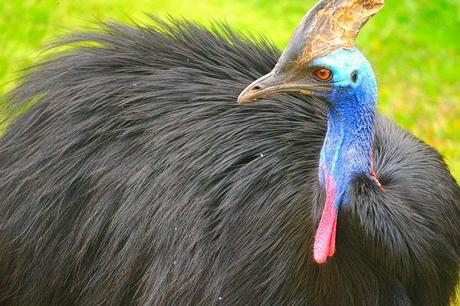
They Really Do Descend From Dinosaurs
Now; all birds descended from dinosaurs but none of them retains as many features from their ancestors as the cassowary. The horn-like crest is one feature that dinosaurs are believed to have had while they lasted. The most relatable evidence of their ancestry to the dinosaurs are the claws on their feet. Dinosaurs are believed to have had similar clawed feet. The cassowary’s body shape and general body functions are also different from those of any other bird and most of them can only be traced back to their extinct ancestors.
They Are Extremely Endangered
Car accidents are unfortunately the biggest killer of cassowaries in Australia but the biggest cause of their demise is loss of habitat. More than 80% of the rainforests that were inhabited by Cassowaries in Australia and other pacific nations have been cleared in the last century and the few that are remaining are also encroached by roads and other human activity. Hunting dogs and feral pigs are also a huge threat to these birds and their eggs and chicks. It is fair to say that the 4,000 or so remaining members of the species may be the last of them if conservation efforts are not stepped up.
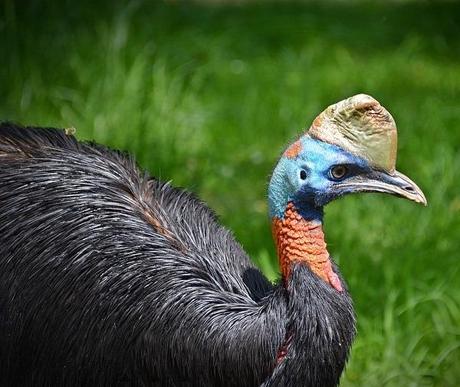
They Are Good Gardeners Too
Cassowaries don’t just depend on forests; the forests also depend on them in a big way. There are trees whose seeds are less likely to germinate unless they go through the cassowary’s digestive system which softens the outer shell of the seeds without digesting the seed. Cassowary also carry seeds and spread them around the forest in their poop allowing the trees to grow in new places where they have better chances of surviving.

